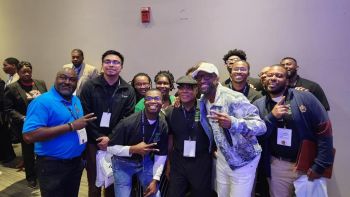Did You ‘Marry’ Your Dad?
- by Healthy SELF, SELF Magazine, 22 hours ago
Jennifer D’Angelo Friedman, SELF magazine
Did you ever take a look at your husband or significant other and think to yourself, “Wow — this guy is a LOT like my dad?”
So have we. So we asked Peggy Drexler, Ph.D., author of the fascinating new book Our Fathers, Ourselves: Daughters, Fathers, and the Changing American Family, whether this is truly a common phenomenon, and whether it’s for better or worse.
HealthySELF: Is it common for women to marry men like their dads?
Dr. Drexler: My research shows that women who are strong and independent do not want to marry their fathers. That myth, based on rigid cultural notions about gender, fueled assumptions and drove old thinking and research. But times have changed. Fathers are raising girls in genderless ways, and daughters are not looking for “daddies” to take care of them. If they do date men like their dads, it’s a step in their development as women, and they move on from there.
That said, a father is the first man a girl gets to know on intimate terms. He’s bigger and stronger than mommy, and in many families, wields the most power. He’s around less often, and the little girl learns early on to understand her father’s absences as evidence of his eminence in the outside world: If he’s so important out there, he must be worth pleasing here, at home. Many daughters idealize their fathers because they don’t know them well enough to see their weaknesses, their vulnerabilities and their flaws. The father’s fallibility remains elusive, and his daughter, perceiving his strengths but not his frailties, desires his approval — and unconsciously seeks to duplicate the relationship with a partner.
Related: 8 Questions Every Woman Should Ask Her Dad
There is no doubt that the father is an influence, but it is not a cause-and-effect scenario. These days, women are much more likely to look for a man who represents the best qualities of their father, and avoid men who have the undesirable qualities their dad might have had.
HS: How can you figure out if you will or did marry your dad?
Dr. Drexler: Among the women I interviewed [for the book], adult daughters felt that there was a direct connection to the fathers in their choice of men as romantic partners. For example, some women said they were at a loss as to how to flirt with men because their childhood interactions with their dads had been distant, formal, or fraught with tension, thus denying them a safe place in which to practice using their girlishness to gain favor with the opposite sex. Others said they were clumsy or inept at bantering with men and attributed their discomfort to their uneasiness with their own fathers.
One interesting finding was that many women said they demanded good treatment from romantic partners because of the way their dads had treated them — both good and bad. Some women liked the gallantry with which their dads had treated them and demanded it from their boyfriends; others were so wounded by their fathers’ insensitivity that they refused to tolerate it from the men they dated. Both patterns showed that many of today’s women are aware of their fathers’ influence on their self-esteem — an encouraging sign — and they are applying that awareness to make better choices in partners.
HS: What are some “good dad” qualities to look for in a partner?
Dr. Drexler: The fundamental traits: Not whether he can match his tie to his shirt, but whether he is honest, kind, worthy of respect and trust, dependable, able to demonstrate love and approval and beyond that, does he have a sense of humor? Can he laugh at himself?
See Also: Your Mom and Your Weight
HS: If your dad wasn’t a good dad, how can you resist the inclination to marry someone like him? Which qualities should you try to avoid?
Dr. Drexler: Some women were treated with respect — even gallantry — by their fathers, and they demanded nothing less from the other men in their lives. Conversely, some were treated with insensitivity, or even emotional cruelty. And their attitude is: “Been there. Won’t do it again.” Sadly, there were those who followed the classic assumption that women will seek to repeat what they experienced growing up. It’s not a universal truism, but it certainly does happen.
The most appropriate bond is one woven out of unquestioned love, consistency, high expectations and a lot of hands-on participation. At the far end of inappropriate, of course, is abuse. But even though it’s far short of that tragedy, there is also real damage done by emotional distance and indifference. Girls see themselves through the eyes of their fathers. And what they see there is a tremendous factor in self-worth.
HS: Is it fair to compare your partner to your dad? Doesn’t every man have his own unique strengths and weaknesses?
Dr. Drexler: Yes, your partner will have his own qualities, endearing traits and foibles — and yes, again, it is almost impossible not to compare one’s partner to one’s father. The bottom line — this is a new generation of daughters raised to share equally — financially and emotionally, with their husbands. They weren’t raised, like their mothers were, to be traditionally feminine and complementary to men. In their marriages, there’s room for individuality and self-expression, and there’s much more sharing of the tasks and financial burdens of married life. It used to be that a father took care of his daughter, and then handed her over to another man. But today, girls don’t want to marry their dads; they want to be their dads.
HS: Is a marriage more or less likely to be successful if you marry someone like your dad?
Dr. Drexler: It’s most important that a partner is someone who is a good match for you. You can love your father, you can look up to him and adore him, but it may not be the best thing to marry someone like him. A father is an important influence but he is not the only influence. There are many influences — entering school, transitioning from one developmental stage to another, experiences with friends, college and career — all of these and more have their influence on a woman’s choice and how well she gets along with her husband. Women seek relationships because the other person excites them, and expands them. Like a Chinese menu, women seek to compile a profile of the man they want to marry, selecting the qualities they most admire and cherish.
















